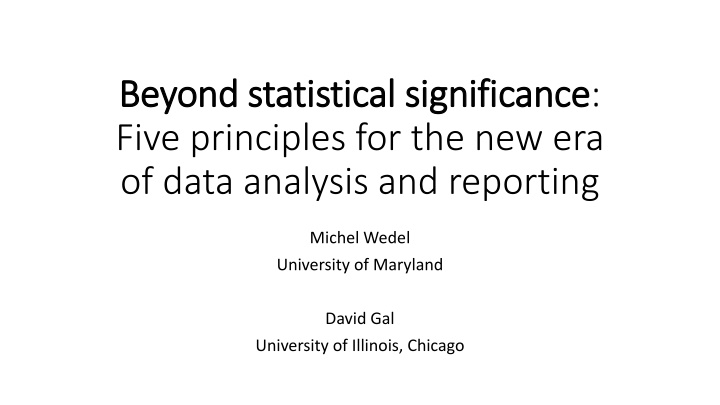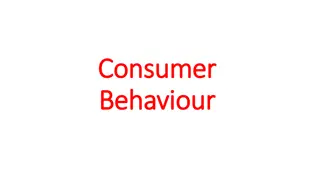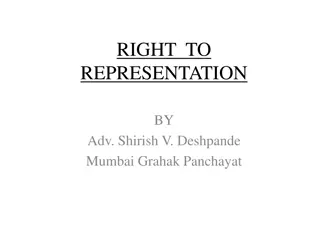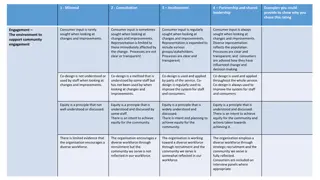Five Principles for Data Analysis and Reporting in Consumer Psychology
Crisis in research findings calls for new principles: 1) Avoid relying on cutoffs for significance, 2) Check model assumptions, 3) Focus on replicability via theory, 4) Emphasize broad theories for practical relevance.
Uploaded on Sep 15, 2024 | 2 Views
Download Presentation

Please find below an Image/Link to download the presentation.
The content on the website is provided AS IS for your information and personal use only. It may not be sold, licensed, or shared on other websites without obtaining consent from the author.If you encounter any issues during the download, it is possible that the publisher has removed the file from their server.
You are allowed to download the files provided on this website for personal or commercial use, subject to the condition that they are used lawfully. All files are the property of their respective owners.
The content on the website is provided AS IS for your information and personal use only. It may not be sold, licensed, or shared on other websites without obtaining consent from the author.
E N D
Presentation Transcript
Beyond statistical significance Beyond statistical significance: Five principles for the new era of data analysis and reporting Michel Wedel University of Maryland David Gal University of Illinois, Chicago
Motivation Motivation A crisis of confidence in research findings in consumer psychology and other academic disciplines has led to various proposals to abandon, replace, strengthen, or supplement the null hypothesis significance testing paradigm. The proliferation of such proposals, and their often-conflicting recommendations, can increase confusion among researchers. We aim to bring some clarity by proposing five simple principles for the new era of data analysis and reporting of research in consumer psychology.
PRINCIPLE 1 PRINCIPLE 1 Designating Effects As statistically significant based on a Cutoff On Measures of Evidence is Ill-Advised; Use Judgment to Interpret Continuous Measures of the Strength of Evidence of an Effect Rather than relying on a single cutoff on the p-value, researchers should present coherent, verifiable, and principled arguments that the evidence from a sequence of studies, as quantified by one or more statistical measures, increases the confidence in their theoretical propositions.
PRINCIPLE 2 PRINCIPLE 2: P-Values are Sensitive to Departures of Model Assumptions; Check Assumptions and Rely on Classical P-Values Especially When Sample and Effect Sizes are Large Attention to assumptions underlying statistical tools is warranted, but under the right conditions standard statistical methods are robust. The method that is ultimately applied should be as complex as needed to address the problem at hand, but not more complex than that.
PRINCIPLE 3 PRINCIPLE 3: Formal Population Inference is Rarely Relevant to Studies in Consumer Psychology; Establish Replicability of Findings to New Settings Primarily Via Theory and Sound Rethorical Arguments Rather than fruitlessly attempting to circumscribe the bounds of effects, we should build and test broad theories, and rely on them and on sound judgment to infer the applicability of findings to alternate contexts that support further theorizing and are relevant for practice.
PRINCIPLE 4 PRINCIPLE 4: More Statistical Measures of Evidence and More Data Are Better than Fewer; Do Not Get Hung Up On Specific Measures, Power Calculation, or Meta-Analysis While larger samples, more studies, and more measures of evidence are, ceteris paribus, preferred to less, no specific measures of evidence (even p-values) or processes to obtain the evidence ought to be privileged or mandated.
PRINCIPLE 5 PRINCIPLE 5: Whether Questionable Research Practices are Questionable Depends on the Statistical Method Used; Reporting Procedures and Findings in a Transparent and Complete Manner Should Take Precedence Open Science (OS) practices should become more widely accepted in consumer psychology.























